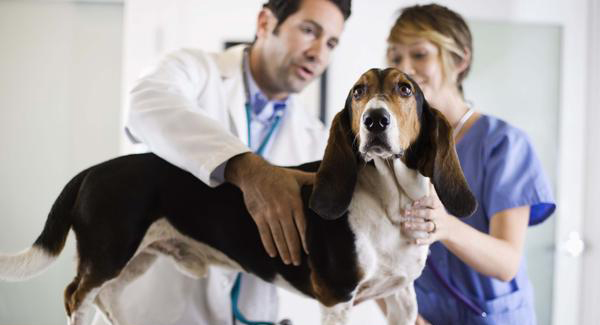Talking To Your Vet About Chronic Kidney Disease (CKD, CRF, CRD)
If your dog has been diagnosed with kidney disease and has shown signs of it for several months or years, he technically has chronic kidney disease. The terms “chronic renal disease (CRD),” “chronic renal failure (CRF),” and “chronic renal insufficiency” are all the same thing.
CKD has many causes and symptoms. The specific cause for your dog may not be obvious because it might take a long time for the signs to become apparent. Some common causes of CKD include:
Birth defects of the kidneys
- Bacterial infections of the kidneys
- Hypertension
- Immune system diseases
- Kidney diseases that cause damage
CKD is a progressive disease, so usually by the time symptoms are present, the damage is substantial. The disease is almost always fatal within months to years. The good news is that with treatment, your pet will have comfort for his remaining time.
Signs of CKD
The signs that your pet exhibit could vary a lot because the kidneys are so complex. Some may appear quickly, while others may take much more time.
- Increased drinking
- Increased urinating
- Incontinence
- Vomiting and diarrhea
- Weight loss
- Decreased appetite
- Depression
- Anemia
- Weakness
- Possible bone fractures
- Possible blindness
- Possible internal bleeding and bruising
Many of these symptoms accompany other types of ailment, so diagnostic testing needs to rule out other possibilities.
Diagnosing and Treating CKD

To rule out other illnesses and to positively diagnose CKD, a lot of testing is necessary. In order to diagnose and stage CKD, some common tests are:
X-rays to see the size of the kidneys. Dogs with CRD have small kidneys because of nephron death. If the kidneys are large in the X-rays, something else may be the culprit, or there could be another reason for the presumed CRD. Lymphoma or acute kidney failure are possibilities.
A kidney biopsy might determine the cause for CKD. This test usually reveals a lot of information when performed on large kidneys. Although this test won’t affect a treatment plan, it is beneficial if you have dogs that are related or if the dog is part of a breeding program since it’s a congenital disease.
A bacterial culture could determine if the dog is suffering from any bacterial infections due to a compromised immune system.
The most common tests performed on dogs with CKD include blood work and urine tests. Some of the common abnormalities usually seen include:
- Non-regenerative anemia
- High BUN and creatinine
- Increased phosphorus
- Increased calcium
- Diluted urine
- Differing amounts of protein or bacteria present in urine
- Treatment of CKD
The severity of symptoms and disease progression determine the type of treatment plan. Some treatments work better for some dogs, and not all treatments are appropriate for all dogs. Dogs with severe symptoms may be hospitalized for IV therapy, which may help them to feel better. Dogs with extremely severe cases may have no response to the treatment.
If your dog doesn’t have a lot of symptoms or is only showing mild ones, a conservative treatment is often performed. The goal is to reduce the work the kidneys have to do to function at an appropriate level. Months may be needed to see any improvement.






